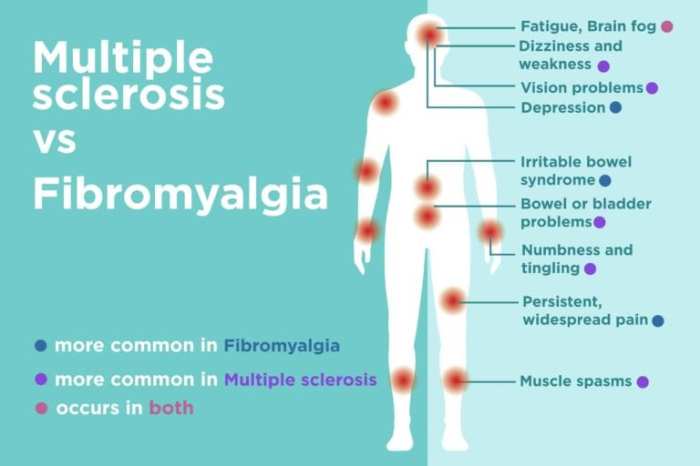Complex regional pain syndrome vs fibromyalgia – Complex regional pain syndrome (CRPS) and fibromyalgia are two chronic pain conditions that share overlapping symptoms, making differential diagnosis challenging. This exploration delves into the complexities of these conditions, examining their etiology, symptoms, diagnosis, treatment, prognosis, and differential diagnosis to provide a comprehensive understanding of their distinct characteristics.
CRPS, previously known as reflex sympathetic dystrophy, is a regional pain syndrome characterized by intense, burning pain, swelling, and temperature changes in an affected limb. Fibromyalgia, on the other hand, is a widespread pain condition that affects multiple areas of the body, often accompanied by fatigue, cognitive difficulties, and sleep disturbances.
Etiology
Complex regional pain syndrome (CRPS) is a chronic pain condition that typically affects one limb. The exact cause of CRPS is unknown, but it is thought to be caused by a combination of factors, including nerve damage, inflammation, and changes in the way the brain processes pain signals.
Fibromyalgia is a chronic pain condition that causes widespread pain and tenderness. The exact cause of fibromyalgia is also unknown, but it is thought to be caused by a combination of genetic, environmental, and psychological factors.
Potential triggers and risk factors for CRPS, Complex regional pain syndrome vs fibromyalgia
- Trauma, such as a fracture, dislocation, or crush injury
- Surgery
- Stroke
- Heart attack
- Diabetes
- Multiple sclerosis
- Parkinson’s disease
Potential triggers and risk factors for fibromyalgia
- Genetics
- Stress
- Anxiety
- Depression
- Sleep problems
- Certain medications
- Environmental factors, such as exposure to toxins or mold
Symptoms

CRPS is characterized by a variety of symptoms, including:
- Pain
- Swelling
- Temperature changes
- Skin changes
- Muscle weakness
- Joint stiffness
- Limb discoloration
Fibromyalgia is characterized by a variety of symptoms, including:
- Widespread pain
- Fatigue
- Cognitive issues
- Sleep problems
- Headaches
- Irritable bowel syndrome
- Depression
Diagnosis

CRPS is diagnosed based on clinical examination and imaging tests. The clinical examination will include a physical exam and a neurological exam. The imaging tests may include X-rays, MRI, and bone scans.
Fibromyalgia is diagnosed based on physical examination and symptom evaluation. The physical examination will include a pain assessment and a tender point exam. The tender point exam involves applying pressure to specific points on the body to assess for pain.
Treatment
The treatment for CRPS includes medication, physical therapy, and nerve blocks. Medication may include pain relievers, anti-inflammatory drugs, and antidepressants. Physical therapy may include exercises to improve range of motion and strength. Nerve blocks may be used to block pain signals from the affected limb.
The treatment for fibromyalgia includes medication, exercise, and cognitive behavioral therapy. Medication may include pain relievers, anti-inflammatory drugs, and antidepressants. Exercise may include aerobic exercise, strength training, and flexibility exercises. Cognitive behavioral therapy may help patients to manage their pain and improve their quality of life.
Prognosis: Complex Regional Pain Syndrome Vs Fibromyalgia
The prognosis for CRPS varies. Some patients experience complete recovery, while others experience long-term pain and disability. The prognosis for fibromyalgia is also variable. Some patients experience significant improvement in their symptoms, while others continue to experience pain and fatigue.
Differential Diagnosis

| Feature | CRPS | Fibromyalgia |
|---|---|---|
| Pain | Localized to one limb | Widespread |
| Swelling | Present | Absent |
| Temperature changes | Present | Absent |
| Skin changes | Present | Absent |
| Muscle weakness | Present | Absent |
| Joint stiffness | Present | Absent |
| Limb discoloration | Present | Absent |
| Fatigue | Absent | Present |
| Cognitive issues | Absent | Present |
| Sleep problems | Absent | Present |
| Headaches | Absent | Present |
| Irritable bowel syndrome | Absent | Present |
| Depression | Absent | Present |
FAQ Corner
What is the primary symptom that differentiates CRPS from fibromyalgia?
Regionalized pain in an affected limb is a key distinguishing symptom of CRPS, while widespread pain throughout the body is characteristic of fibromyalgia.
Can CRPS and fibromyalgia occur simultaneously?
Yes, it is possible for an individual to have both CRPS and fibromyalgia, although this is not common.
What is the prognosis for CRPS and fibromyalgia?
The prognosis for CRPS and fibromyalgia varies depending on the severity of the condition and individual response to treatment. Some individuals may experience significant improvement, while others may have persistent symptoms.